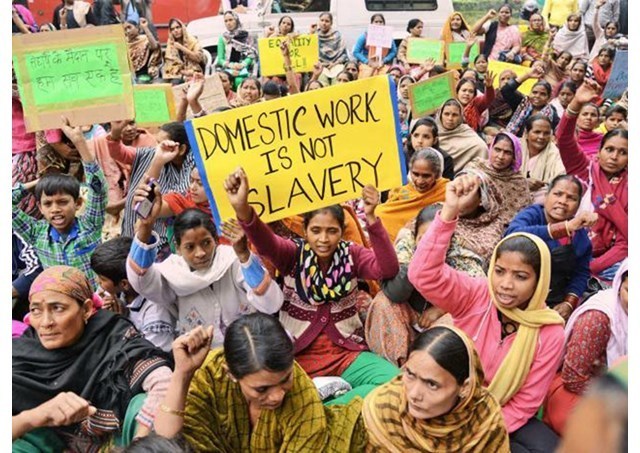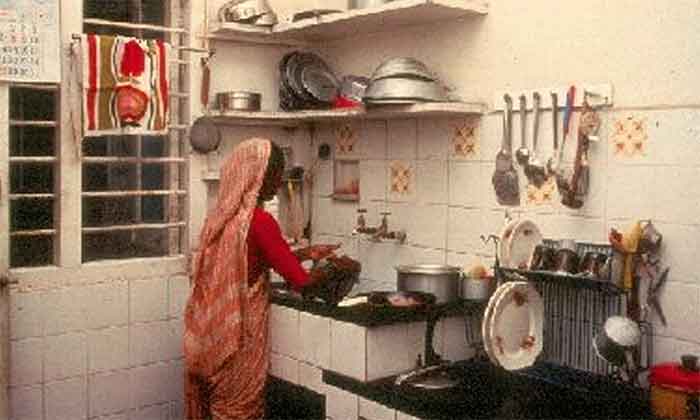
For two years, Usha Thopna’s day started at 5 am. After waking up, she would cook and clean for her new employers in Bangalore – Mr. and Mrs. Vatsa. Barely an adult herself, she had to look after their child too, and do various chores demanded of her at their whim. During her 18-hour long work day, she would additionally have to face her employers’ verbal and physical violence: she was beaten with cricket bats, injured by scissors to her neck, not given proper food, and burnt by the iron box. Usha hails from a remote village in Tejpur, Assam. She worked in Delhi before being sent to Bangalore by her agency Milan Teeta, without informing her parents of this transfer. The agency also took an advance payment from the Vatsas, with the agreement that they would pay Usha a handsome sum of 1800 rupees per month. She never saw this money. Usha lived in fear for her life for two years, before being rescued and taken to a shelter home. Although a case was filed with the Mahadevpura police station, no action was taken against the employers or the agency. Finally, Usha was sent back her village to be with her family, while the traffickers and employer got away scot-free.
This is unfortunately not a one-off incident. There are thousands of vulnerable girls facing similar situations across India, falling prey to trafficking networks. These girls, especially from Dalit, Adivasi, and other marginalised sections, migrate to the cities to join the growing unskilled unorganized labour sector. They fall prey to known people who promise them jobs and steady salaries. With the hope to alleviate the poverty their families are facing, these girls pack up and leave, with no knowledge of where they are going or how to get back. On reaching the big cities, they are handed off to agencies. Without any contract or paperwork, these agencies send them to households as domestic workers once an advance deposit is received from the employers.
Most employers just want good workers who will do the work without complaining or demanding too much. Usually, when looking for a domestic help, they approach agents, whose contacts they receive via word of mouth from friends. These friends would have used their services before and gotten ‘good maids’. The girls are stripped of all paperwork and identification proof before being sent to these houses. Their home’s contact information lies with the agency. The girls rarely have any regular contact with their families once they leave the village.
These agencies take no responsibility for the girls’ safety or wellbeing. Once they receive the advance, the agencies leave the girls to fend for themselves, as happened in the case of Munni. She was taken from her village at the age of 12, and was found dead five years later in the apartment complex of her then employers. Neighbours and eye witnesses say she was ill-treated, made to wear rags, sleep on newspaper in the balcony, and was too scared to talk to anyone for fear that her employers would find out and she would be physically abused again. Munni saw no way out other than ending her life. Despite the rare news coverage her case received, the government did not take any action. Due to this complacency in trafficking, no justice has been served.
Causal factors:
Usha and Munni’s story illustrate the immense vulnerability of these girls, and the invisible exploitation in their lives. In this context, migration plays a huge role, which continues unchecked with devastating effects on different populations in terms of space, housing, identities, and resources. Beyond that, there is ‘unsafe migration’, wherein hundreds of thousands of vulnerable women and girls are trafficked for sexual slavery, forced labour, and servitude. Many instances have come to light where girls trafficked for domestic work are cheated and pushed into the flesh trade!
This invisible vulnerability and helplessness are still paradoxically more obvious than the reasons for which they exist. The major reason for this is the lack of economic opportunities in the source areas – no development, no means of earning, and no new livelihood opportunities – all making it difficult to survive. The lure of employment and a stable monthly salary all year round is an opportunity people cannot afford to ignore. With the collapsing agrarian economy and no signs of it being revived anytime soon, and the lack of vision on the government’s part in delivering jobs, create a workforce eager and desperate for employment. With no knowledge of how to go about getting a job in the cities, a vulnerable population of women and girls in villages is exploited by men who have already migrated from these villages. These men, who are merely brokers for illegal agencies in the city and get a commission for their service, promise families that they will find employment for their daughters.
Thousands of girls all over the country in search of livelihoods fall prey to placement agencies in this way and enter the urban upper middle class and elite households.
Most of these women and girls hail from North East, Bengal, Orissa, Jharkhand, and surrounding areas. Though tracking the trafficking routes, networks, source and destination areas still remains a challenge in tackling this problem, as it is difficult to access the private spaces of households, as also the ‘personalisation’ of the employer-employee relationship.
Intersectionality of caste and gender:
In India, there is a clear social pattern to trafficking, wherein the overwhelming victims are Dalits and Adivasis. The US State Department, in its Trafficking in Persons Report of 2016, said, “India is a source, destination, and transit country for men, women, and children subjected to forced labour and sex trafficking…The majority of India’s trafficking problem is internal, and those from the most disadvantaged social strata—lowest caste Dalits, members of tribal communities, religious minorities, and women and girls from excluded groups—are most vulnerable… Thousands of unregulated work placement agencies reportedly lure adults and children under false promises of employment for sex trafficking or forced labour, including domestic servitude.”
According to the UK’s Dalit Freedom Network, today in India a Dalit is 27 more times likely to be trafficked than anyone else. Marginalization and deprivation due to caste is at the heart of slavery, trafficking, forced labour, child labour and domestic servitude. Dalits, Adivasis, landless OBCs, among them largely women, form the largest proportion of migrant and forced labour.
Stakeholders:
Stakeholders involved, in the case of domestic work, have to be understood in the context of the ambiguity in which the domestic workers are situated i.e., the arbitrary employer-employee relationship, personalization of this relationship, privacy factor of households, no definition of workplace, irregular and variable terms of employment, no legal frameworks and unstructured enforcement mechanisms, and unlimited supply of labour. While the visible stakeholders are the employers, workers, and to an extent the government, the most invisible yet consistent are the placement agencies. With no comprehensive study or data on the number of placement agencies and their functioning, they still remain a necessary evil for those seeking livelihood. There has been very little political will to bring any policy to regulate the involvement of these agencies in the organized crime of trafficking.
Additionally, many domestic workers are employed living-in with their employer’s family. It is this combined site of living and working that creates an arena of ambiguity in relationships between worker and employer. Is the domestic worker ‘one of the family’, for which privilege she should be grateful? Should this relationship be ‘regularized? If yes, how? Whatever may be the method, it is imperative that the servitude behind the closed doors needs to be brought to an end.
National and International Legal Framework:
At the International level, after much lobbying and pressure, the International Labour Organisation passed the Convention 189 in 2011. This was a welcome and historic step in the history of domestic work. The Convention, named as ‘Decent Work for Domestic Workers’, contains provisions on wages, leave, health and safety, social security, and social protection. It also restricts child labour trafficking in domestic work, and talks of the regulation of workers, employers, responsibilities of the government, access to and coverage under other laws, and courts for dispute resolution and conflict resolution.
This landmark convention paves the way for a national legislation in the countries that are a part of the ILO. Even after 12 years, India has not ratified the Convention, with the Minister for Labour repeatedly stating in the parliament since 2015 that since our national laws are not aligned with the convention, it cannot be ratified. The situation in 2023 has not changed since i.e. Indian laws still do not meet international standards. On the other hand, 36 other countries have already ratified the Convention and are moving ahead to introduce relevant legislation.
If anything, the Central Government, which was till 2019 was drafting a National Policy on Domestic Workers, recently stated that there is no such policy under consideration. This policy, if it had seen the light of the day, through government’s own admission, would have addressed many policy gaps like bringing domestic workers under coverage of existing labour laws, providing grievance redressal mechanisms, regulating private placement agencies, minimum wages and social security, among others. The Central Government has repeatedly put the onus on States to frame relevant laws in this sector.
While the ILO convention speaks largely of the world-wide experience of the live-in and migrant workers, in the Indian context, it also applies to the part time workers, as well as those who work in defense households in Cantonment areas. Since India still lacks a comprehensive regulatory mechanism for this sector, it leaves crores of women working as maids, cooks, helpers, and ayahs unable to access legal protection. As of March 2023, over 2.79 crore people have registered on the Central Government’s eShram portal as domestic workers.
From the ground experience, only legal recourse to achieve regulation and justice in this sector is not enough. To holistically address the issues faced by domestic workers, a cultural and attitudinal change in employers, government, society at large, and in domestic workers themselves is urgent.
The Road Ahead – Your Decency, My Dignity
What ILO C189 spells out is a good place to begin – Decent Work for Domestic Workers. Here the focus is on the word ‘decent’, and what it encompasses. In discussions with domestic workers themselves, they have articulated dignity, legal frameworks, grievance redressal mechanisms, equality, doing away with patriarchy, no caste or gender discrimination, no sexual harassment, dignified working conditions with provisions for minimum wages, leave, compensation in case of accidents, no arbitrary dismissal from work, health and safety, recognition as a worker and not as a slave, as all elements of a decent workplace. This concept implies that privacy of a household cannot take precedence over enforcement of laws applicable to a workplace, and decency also means that employers need to be professional and decent in their treatment of domestic workers.
To implement this vision, it is imperative that India ratifies the ILO Convention 189, and brings national laws in alignment with this visionary document. As for cultural change, the attitude of the society, when it comes to domestic work, needs to come out of the feudal mentality of demeaning their work and treating them as slaves. Only then can we come out of a tokenistic celebration of International Domestic Workers Day to a real one celebrating their rights.
This article is being published on the occasion of International Domestic Workers Day, observed every year on June 16.
Geeta Menon is a Bengaluru-based women’s rights activist and social worker, with decades of experience in labour and women’s rights with multiple national and international organisations. She is also the Joint Secretary of the Domestic Workers Rights Union, Bengaluru.
With inputs from Puneet, a volunteer with the Domestic Workers Rights Union.
This article was first published on Citizen Matters Bengaluru, an online civic media website supported by Oorvani Foundation.











































